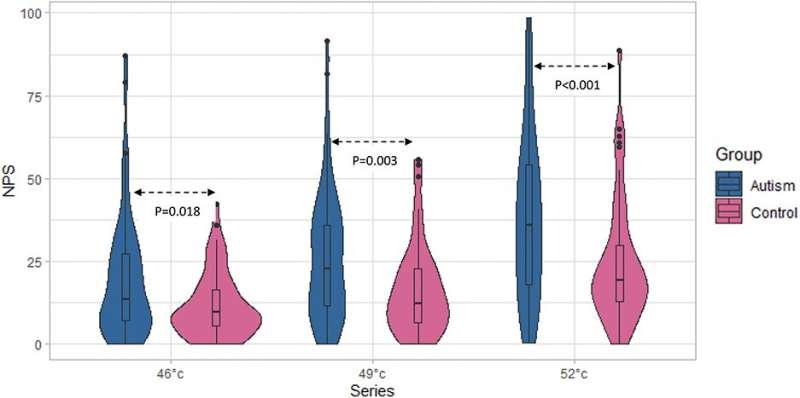New evidence questions the assumptions about pain in autism

People with autism have normal pain thresholds but increased sensitivity to painful stimuli, concludes a study in PAIN.
"This evidence demonstrating enhanced pain sensitivity warrants changing the common belief that autistic individuals experience less pain," according to the report by Prof. Irit Weissman-Fogel of University of Haifa, Israel, and colleagues. They believe their findings highlight the need for increased awareness, which may impact effective treatment of pain in people with autism.
The researchers aimed to test the "prevailing assumption" that people with autism are hypo-sensitive to pain. Current diagnostic criteria suggest that autistic people demonstrate "apparent indifference" to pain or temperature. Yet most previous studies have not shown differences in pain sensitivity in autistic individuals.
Prof. Weissman-Fogel and colleagues performed in-depth laboratory tests of pain perception in 104 adults, 52 with autism. This sample is the largest as of yet testing pain psychophysics in autism. The two groups had similar scores on a brief cognitive test. People with autism had higher use of psychiatric medications, and rated themselves as having greater anxiety as well as higher sensitivity to pain and to daily environmental stimuli (such as smell, noise, light).
On quantitative sensory tests, there were no differences in thermal and pain detection thresholds between the autistic and non-autistic groups. This indicates normal pain and thermal thresholds, suggesting "normal functioning of the peripheral nervous system" among participants with autism.
However, the autistic group gave consistently higher pain ratings in response to various stimuli above their pain threshold, proving pain hypersensitivity. The tests also provided evidence that people with autism can successfully inhibit short pain stimuli but not long-lasting pain stimuli. Importantly, experiencing long-lasting pain in daily life is a risk factor for developing chronic pain.
New findings may lead to early treatment and better quality of life
Together, the findings suggest that people with autism have a "pro-nociceptive" pain modulation profile: their brain appears more active in facilitating pain experience and less active in inhibiting continuous pain. This is consistent with the theory of excitatory/inhibitory imbalance as an underlying mechanism of autism spectrum disorder—but one that has been neglected in terms of pain processing.
The study questions the perception that people with autism experience less pain, and instead suggests that they may have enhanced pain sensitivity. Prof. Weissman-Fogel and colleagues write, "This misinterpretation can lead to late diagnosis and poor treatment causing suffering and exacerbating the autistic symptoms"—potentially increasing the risk of developing chronic pain conditions.
While their study focused on a group of autistic people with essentially normal cognitive function, the researchers write, "these results may also apply to people with autism whose cognitive and verbal communication impairments may eliminate their ability to communicate their pain."
Prof. Weissman-Fogel and coauthors conclude, "These findings may raise physician, parent, and caregiver awareness to the pain phenomenon in autism, and thus lead to early and effective treatment to improve the well-being and quality of life for autistic individuals and their families."
More information: Hoffman, Tseelaa et al, Indifference or hypersensitivity? Solving the riddle of the pain profile in individuals with autism, PAIN (2022). DOI: 10.1097/j.pain.0000000000002767. journals.lww.com/pain/Fulltext … Solving_the.163.aspx



















